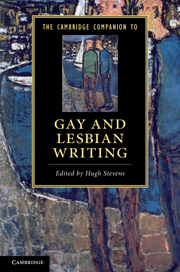Book contents
- Frontmatter
- Homosexuality and literature: an introduction
- Part I Repression and Legitimation
- Part II Affiliations
- Part III Literary Traditions
- 10 Encountering the past in recent lesbian and gay fiction
- 11 Queer cross-gender collaboration
- 12 Naming the unnameable: lesbian and gay love poetry
- 13 The queer writer in New York
- Guide to further reading
- Index
12 - Naming the unnameable: lesbian and gay love poetry
from Part III - Literary Traditions
Published online by Cambridge University Press: 28 January 2011
- Frontmatter
- Homosexuality and literature: an introduction
- Part I Repression and Legitimation
- Part II Affiliations
- Part III Literary Traditions
- 10 Encountering the past in recent lesbian and gay fiction
- 11 Queer cross-gender collaboration
- 12 Naming the unnameable: lesbian and gay love poetry
- 13 The queer writer in New York
- Guide to further reading
- Index
Summary
In any survey of love poetry in English, poets as varied as Shakespeare, Walt Whitman, Gertrude Stein, W. H. Auden and Adrienne Rich could hardly be excluded. Yet to consider gay and lesbian love poetry as a category in itself is to face hard questions. Some are of a conceptual order that queer studies has long contended with. Knotty problems, for example, arise on recognizing the social constructedness of sexual identity categories. So, we might ask, what justification can be made for calling Shakespeare 'gay', since he wrote centuries before the 'invention' of modern homosexuality? Or we might consider whether lesbian and gay male literary production share more with each other than not, given the historical differences in the experiences of gay men and lesbians. How much sense does it make to group W. H. Auden together with Audre Lorde, even though both wrote powerful love poetry? Further questions would enter into any thoughtful effort to consider the nature of lyric expression - for example, how exactly does the lyric 'I' relate to the authorial subject? How is intentionality related to poetic meaning in erotic contexts? Surely these are important in considering, say, Christina Rossetti's quite popular and, to our ears, intensely homoerotic 'Goblin Market'. And what about love, anyway? What sense of 'love poetry' includes not just Shakespeare's sonnets to the young man but Allen Ginsberg's sado-masochistic prayer 'Please Master'?
- Type
- Chapter
- Information
- The Cambridge Companion to Gay and Lesbian Writing , pp. 202 - 217Publisher: Cambridge University PressPrint publication year: 2010



